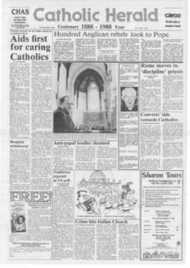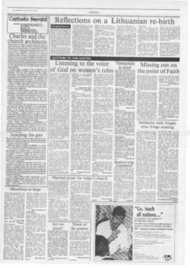Page 5, 4th November 1988
Page 5

Report an error
Noticed an error on this page?If you've noticed an error in this article please click here to report it.
Tags
Share
Related articles
The Real Agenda In South Africa
One Year On Namibia Awaits Freedom
Tension Grows In Namibia As Election Result Nears
Tears For The Return Of A Lost Generation
Healing The Scars Of Apartheid
A majority not fooled by South Africa's ploy
Tom Minney, recently returned from South Africa, assesses last week's poll and its effects for the majority population
MORE BOMBINGS than ever before, attacks on the churches and hundreds of detentions marked the first polls in South Africa in which all races voted on the same day. The elections were for racially separate local and municipal councils but the issues were national. All sides have claimed victory, but there is no indication of an early end to South Africa's agony.
Government-run radio described them as "the most important elections in South Africa's history". Despite desperate measures to encourage or force them, only a tiny proportion of black people voted, sending a clear message that merely reforming apartheid would not satisfy them. Many whites voted even further to the right than the ruling National Party, signalling their allegiance to a return to hard-line discrimination. The resulting gulf does not bode well for the future.
Election campaigning was brutal and determined, with any criticism of the polls outlawed and threats of ten years in prison for calling for a boycott. Catholics and other church people were among those in the firing line of detentions and attacks after church leaders at all levels had defied the Government by calling for a boycott.
Last month, during a visit to South Africa, I met one church worker hours before she was detained indefinitely. Catholic Theresa Solomon, assistant organising secretary of the Western Province Council of Churches, drove us into Cape Town on the morning of September 22. After lunch police took her from the office, accusing her of campaigning for a boycott. She was released earlier this week.
Three weeks ago, as church leaders continued to denounce the elections and detentions, arsonists gutted the headquarters of the Southern African Catholic Bishops' Conference (SACBC) in Pretoria. They could have killed seven people staying in the building including an Irish nun, Sr Brigid Flanagan.
The work of Christian Aid and CAFOD has also been hit by the electioneering. Christian Aid supports the Dependents' Conference of the South African Council of Churches, which helps families of detainees and publicises detentions. By the time I left South Africa, six workers had been detained and more have been picked up since.
Government campaigning began in earnest last February, when 17 organisations representing most of the voices of peaceful opposition to apartheid were banned or heavily restricted.
The Church entered the ring as the only remaining organisation to openly voice popular opposition to voting. Its nonviolent campaign included a letter signed by Catholic Bishop G F Daniel of Pretoria, Anglican Archbishop Desmond Tutu and 24 other church leaders as part of a campaign called "standing for the truth in the light of the Gospel".
Their letter says: "Christians cannot accept structures of racial discrimination. These structures constitute the apartheid system which we have declared to be evil and sinful. We cannot participate in the elections and we call on all Christians not to participate in the implementation of their own oppression".
Church leaders followed this up with many similar statements. Many of the major churches wrote pastoral letters for ministers to read out across the country. I experienced the awed hush as a Methodist minister read one in a packed church in Guguletu — his brave words put him at risk.
The Catholic pastoral letter said the elections were part of a two-pronged "total strategy" by the Government aimed at keeping power and entrenching apartheid. First comes security, which involves arresting, detaining or just "disappearing" people actively involved in community organisation. This is followed by reform — improvements to living conditions in some of the townships, and propaganda such as the £1 million spent on media advertising for the elections.
To get a high turn-out of black voters, the Government made up its own election rules. Of South Africa's 26 million black people, only one and a half million were eligible to vote, and some townships were excluded altogether as "too problematic".
People were also allowed to vote up to two weeks early, but in nearly half the black constituencies elections were not held at all, either because no eligible candidates came forward, or because a candidate was unopposed.
When voting closed, the Government claimed a successful turnout of between 20 and 30 per cent of the voters, or two per cent of the overall population. In Soweto, a township with a population of two million, only 8,080 voted on election day and another 20,000 in advance, giving a miserable turnout of 11 per cent.
Among the whites, the Conservative Party formed eight years ago made significant gains, particularly in Transvaal, where most of South Africa's population and business is based. Conservative Party candidates, calling for even stricter racial segregation and even tighter security, won twothirds of the seats in Transvaal and only just failed to win the capital Pretoria.
The message from the whites is that the Conservatives are here to stay, and will put up a strong challenge to the Nationals in the general election which is due in the next few years. What effect this will have on President Botha's panicky reforms and repression is not yet clear.
The message from the SACC is that the government did not get the mandate it claimed. The boycott had done better than expected and many black people only voted because their pensions, houses and jobs had been threatened if they stayed away.
blog comments powered by Disqus













